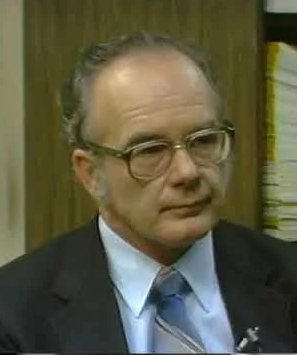Ralph McGehee
(spook, whistleblower) | |
|---|---|
 | |
| Born | April 9, 1928 |
| Died | May 2, 2020 (Age 92) |
| Nationality | US |
| Alma mater | University of Notre Dame |
| Exposed | CIA |
| Interests | • CIA • Thailand |
CIA officer who later developed views highly critical of the CIA. | |
Ralph Walter McGehee Jr [1] was case officer of the Central Intelligence Agency (CIA), serving the CIA for 25 years, and an author. From 1953 to 1972, his assignments were in East Asia and Southeast Asia, where he held administrative posts. Since leaving intelligence work in 1977, he publicly expressed views highly critical of the CIA.[2] and recommended that the CIA be abolished, and a new intelligence agency created, free of links to covert operations.
“The CIA is not now nor has it ever been a central intelligence agency. It is the covert action arm of the President's foreign policy advisers. In that capacity it overthrows or supports foreign governments while reporting "intelligence" justifying those activities. It shapes its intelligence, even in such critical areas as Soviet nuclear weapon capability, to support presidential policy. Disinformation is a large part of its covert action responsibility, and the American people are the primary target audience of its lies.”
Ralph McGehee (1983) [3]
Contents
Early life
McGehee was born in 1928 at Moline, Illinois.[4] His father, originally from Kentwood, Louisiana, where his family had lived for three generations, was of Scotch-Irish descent, and had moved to Illinois when a teenager. His mother was from neighboring Osyka, Mississippi. Along with his older sister, they then had moved from Moline to Chicago about 1930. While a student at Tilden Tech, a "working class" high school in south Chicago now known as Tilden High School, he was All State in football, and class president. Although a Baptist, he attended the University of Notre Dame where he was a starting tackle on the football team. For the four seasons 1946 to 1949, they never lost a game, and won three national championships.[5] McGehee obtained a B.S. in Business Administration, cum laude.
He married Norma Galbreath in 1948.[6] He had met her at a Presbyterian Church in south Chicago while home on vacation from Notre Dame. They had four children, two girls followed by two boys. Often but not always, his wife and children would move their family home to accompany him, while on foreign assignments with the CIA. After graduation from Notre Dame, he tried professional football with the Green Bay Packers. Then he coached the offensive line in the football program at the University of Dayton for a year. Returning to Chicago, circa 1951, he took a job as a management trainee at Montgomery Ward.[7]
Recruitment by the CIA
In January 1952, McGehee was recruited by the CIA. Decades later, he would describe himself, and his political outlook then, as "gung ho" America, a young cold warrior, ready to go.[8]
Understanding it was an important government job with foreign travel, McGehee first was interviewed at the courthouse. The recruiters declined to name the federal agency that might be his new employer. He traveled from Chicago to Washington, D.C., where he joined a pool of over a 100 candidates, men and women. Several weeks of extensive testing and lectures followed. Having survived this shake out, he began a month-long orientation, which featured cold war rhetoric and films. With 50 men he entered a "basic operations" course on espionage, to fit them for the CIA's Directorate for Plans. Then with 30 others he attended a six-week paramilitary course at the CIA's Camp Peary (known as the "farm") near Williamsburg, Virginia. Many there were former college football players. The curriculum included parachute jumping, demolition, weapons, and a "hellish obstacle course".[9]
Thereafter he was posted to his initial CIA post.
CIA assignments
Japan and the Philippines, 1953–1956
McGehee was sent to Japan, where he went to work for the China operations group. The group's task was, in conjunction with allied governments, to gather intelligence on the PRC. The group in the Tokyo area supervised and supported four other offices or bases in East Asia (Seoul, Taiwan, Hong Kong, Okinawa). His job "unfortunately" was as a file checker. Yet he appreciated being involved in "the immense and noble effort to save the world from the International Communist Conspiracy".[10]
He lived with his wife and daughters in a beautiful home in Hayama. They had a maid and a gardener, and a view of Mount Fuji. Husband and wife "became intoxicated with the romance of being overseas." There was "a close knit community of Agency families". A son was born to them. Yet his wife would repeat her complaints about CIA rules which prohibited any talk of company business, even within families; she insisted that the "marital bonds and trust" should be the stronger.
After two and a half years, the China operations group moved to Subic Bay in the Philippines. Desmond FitzGerald, the CIA's Chief of Station (COS) there, would become one of the Agency's top leaders. He was a long-time friend of William Colby (the CIA Director in the 1970s).<ref>Prados (2003, 2009), pp. 89,
- ↑ Obituary: Ralph Walter McGehee Jr.
- ↑ See text below for sources.
- ↑ McGehee, Ralph 1983. Deadly Deceits. Ocean Press. p. 192
- ↑ McGehee, Ralph W(alter) (1928–) in Contemporary Authors published by Gale Cengage, Thomson Gale (April 26, 2006).
- ↑ 1949 Notre Dame Fighting Irish football team. Over 4 seasons: 36 wins, no losses, 2 ties.
- ↑ http://www.legacy.com/obituaries/tampabaytimes/obituary.aspx?n=norma-mcgehee&pid=156086530
- ↑ McGehee (1983), pp. 1–2 (school, football, coaching), 17–19 (marriage, starts family).
- ↑ Youtube.com: "The Secret Government, Bill Moyers (1987) - Ralph McGehee, and other former CIA officers/agents". McGehee on his "gung ho" outlook when young, 28:45-29:13.
- ↑ McGehee (1983), pp. 2–16 (CIA: tests, orientation, training).
- ↑ McGehee (1983), pp. 21–22 (China ops file checker), 22 ("noble" quote).